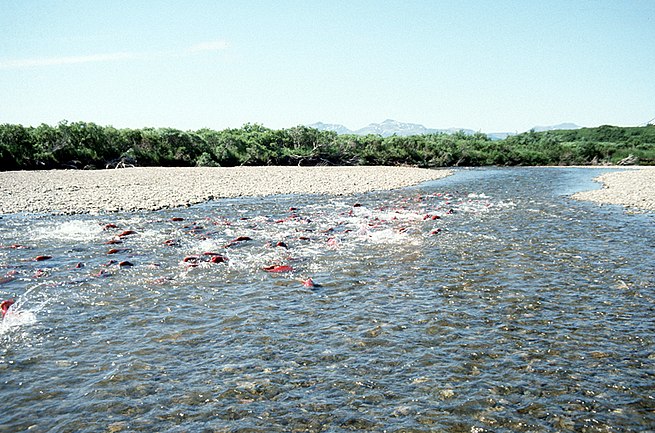
Main Difference
The main difference between Fishery and Fishing is that the Fishery is a entity engaged in raising or harvesting fish which is determined by some authority to be a fishery and Fishing is a activity of trying to catch fish
-
Fishery
Generally a fishery is an entity engaged in raising or harvesting fish which is determined by some authority to be a fishery. According to the FAO, “…a fishery is an activity leading to harvesting of fish. It may involve capture of wild fish or raising of fish through aquaculture.” It is typically defined in terms of the “people involved, species or type of fish, area of water or seabed, method of fishing, class of boats, purpose of the activities or a combination of the foregoing features”. The definition often includes a combination of fish and fishers in a region, the latter fishing for similar species with similar gear types. Some government and private organizations, especially those focusing on recreational fishing include in their definitions not only the fishers, but the fish and habitats upon which the fish depend.
Directly or indirectly, the livelihood of over 500 million people in developing countries depends on fisheries and aquaculture. Overfishing, including the taking of fish beyond sustainable levels, is reducing fish stocks and employment in many world regions. A report by Prince Charles’ International Sustainability Unit, the New York-based Environmental Defence Fund and 50in10 published in July 2014 estimated global fisheries were adding US$270 billion a year to global GDP, but by full implementation of sustainable fishing, that figure could rise by as much as US$50 billion. In additional to commercial and subsistence fishing, recreational (sport) fishing is popular and economically important in many regions.
-
Fishing
Fishing is the activity of trying to catch fish. Fish are normally caught in the wild. Techniques for catching fish include hand gathering, spearing, netting, angling and trapping. “Fishing” may include catching aquatic animals other than fish, such as molluscs, cephalopods, crustaceans, and echinoderms. The term is not normally applied to catching farmed fish, or to aquatic mammals, such as whales where the term whaling is more appropriate. In addition to being caught to be eaten, fish are caught as recreational pastimes. Fishing tournaments are held, and caught fish are sometimes kept as preserved or living trophies. When bioblitzes occur, fish are typically caught, identified, and then released.
According to the United Nations FAO statistics, the total number of commercial fishermen and fish farmers is estimated to be 38 million. Fisheries and aquaculture provide direct and indirect employment to over 500 million people in developing countries. In 2005, the worldwide per capita consumption of fish captured from wild fisheries was 14.4 kilograms, with an additional 7.4 kilograms harvested from fish farms.
-
Fishery (noun)
Fishing: the catching, processing and marketing of fish or other seafood.
-
Fishery (noun)
A place related to fishing, particularly:
-
Fishery (noun)
A place where fish or other seafood are caught: a fishing ground.
-
Fishery (noun)
A place where fish or other seafood are raised: a fish farm.
-
Fishery (noun)
A right to fish in a particular location; Territorial fishing waters.
-
Fishery (noun)
A fishing company.
-
Fishing (noun)
The act of catching fish.
“We had a good day’s fishing at the weekend.”
-
Fishing (noun)
The act of catching other forms of seafood, separately or together with fish.
-
Fishing (noun)
Commercial fishing: the business or industry of catching fish and other seafood for sale.
“This is good news for the fishing industry.”
-
Fishing (noun)
A fishery, a place for catching fish.
Fishery Illustrations





Fishing Illustrations



